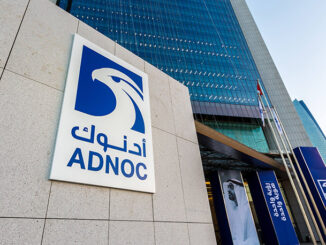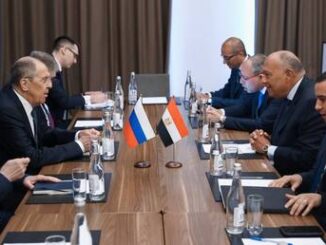
Only a few years ago, a rapprochement between Egypt and Turkey would have been unimaginable, as the countries faced off on multiple fronts, and their leaders attacked each other in speeches.
And yet, fast forward to today, and the regional rivals have begun holding talks at the ministerial level, sending each other warm messages and talking about re-establishing full diplomatic relations.
Earlier this month, Turkish Foreign Minister Mevlut Cavusoglu visited Cairo to hold talks with his Egyptian counterpart Sameh Shoukry for the first time since bilateral relations were severed about a decade ago.
Shoukry said at a joint press conference that ties will be restored to the ambassadorial level at “an appropriate time” and that the presidents of the two countries have the “political will” to normalise bilateral relations.
Cavusoglu confirmed that the two sides “agreed to maximise our diplomatic relations” and “have evaluated what steps we will take next”.
The top Turkish diplomat’s trip to Egypt comes after Shoukry’s landmark visit to Turkey in February following the massive twin earthquakes that killed more than 40,000 people there.
Clear divisions
Diplomatic ties between Cairo and Ankara were severed in 2013 after Egypt’s current President Abdel Fattah el-Sisi led the overthrow of then-President Mohamed Morsi, a former leader of the Muslim Brotherhood, the oldest political Islamist group in the Arab world.
Morsi was the first democratically elected president of Egypt and had the backing of Turkish leader Recep Tayyip Erdogan and his conservative Justice and Development Party (AKP).
Erdogan condemned the coup at the time as “damaging, inhuman and against the people, national will and democracy”.
Since then, Turkey has provided refuge for Egyptian dissidents – many of whom are Muslim Brotherhood leaders who Cairo considers “terrorists” – and allowed them to run satellite television channels that spoke openly against the Egyptian president.
Following the coup, regional powers Saudi Arabia and the United Arab Emirates, who considered the Muslim Brotherhood a danger to their monarchies, backed el-Sisi and slammed Turkey for backing the Muslim Brotherhood.
Ankara’s support for its regional ally Qatar after Saudi Arabia, the United Arab Emirates, Bahrain and Egypt cut diplomatic and trade ties with Doha in June 2017 made regional divisions even clearer.
At the time, the four Arab allies, backed by a few other countries, imposed a sea, land and air blockade on Qatar, claiming it supported “terrorism” and was too close to Iran.
The more than three-year Gulf crisis was resolved in January 2021 after the blockading nations signed agreements with Qatar as they lifted the blockade and normalised relations.
Catalysing rapprochement
According to Turkish foreign policy analyst Semih Idiz, the fact that Doha fixed its relations with its Gulf neighbours and Egypt was a catalyst for Ankara to follow a similar path.
“Turkey would be isolated if it did not change its regional policy, so, I believe, the government started fixing its relations with rival powers in the region with the help of Qatar,” he told Al Jazeera.
In March 2021, reports began to surface that the Turkish government was restricting the activities of Muslim Brotherhood-aligned media outlets and warning them to change their editorial policies and not to target Egypt and el-Sisi.
According to Sinan Ulgen, a senior fellow at Brussels-based think tank Carnegie Europe, Turkey’s policy change towards the Muslim Brotherhood was the main factor in easing tensions between the two countries.
“After the removal of … Morsi from power, Turkey used a harsh non-diplomatic rhetoric against the new government in Egypt, which led to high tensions between the two countries,” Ulgen, who is also a former Turkish diplomat, told Al Jazeera.
“Ankara also got highly involved with Egypt’s internal politics and openly backed the Muslim Brotherhood in the 2010s, which is not the case today. Turkey even limited the activities of the group’s members within its borders, which was received positively in Cairo,” he said.
Turkish President Erdogan, right, shakes hands with Egyptian President Abdel Fattah el-Sisi as they are welcomed by Qatari Emir Sheikh Tamim bin Hamad Al Thani, second right, on the opening ceremony of the 2022 FIFA World Cup in Doha [Handout/Press Office of the Presidency of Turkey/AFP]
He added that Turkey seems to not be as fixed on previous conditions it had over the 2013 coup, such as the release of political prisoners in Egypt.
In the months after the resolution of the Gulf crisis, delegations from Ankara and Cairo met multiple times for exploratory talks.
Turkish Treasury and Finance Minister Nureddin Nebati attended the annual meeting of the Islamic Development Bank in Cairo in June 2022, the first ministerial visit to Egypt in about nine years.
This was followed by Erdogan and el-Sisi, accompanied by Qatar’s Emir Sheikh Tamim bin Hamad Al Thani, shaking hands on the sidelines of the World Cup in Qatar in November 2022, a first between the two leaders.
The rapprochement has been slow for Cairo and Ankara, Idiz told Al Jazeera, and that: “Egypt seems to be waiting for the result of the elections for the next move.”
Cavusoglu had said in Cairo that a meeting between the presidents was planned after the presidential and parliamentary polls in Turkey in May.
Lingering issues
Although the two sides send warm messages and show the political will to fix ties, there are fundamental disagreements to be addressed before they can cooperate, including the conflict in Libya and disagreements over the exclusive economic zone and hydrocarbon resources in the Mediterranean.
Ankara intervened in Libya after signing a military cooperation deal in November 2019 – along with a maritime demarcation agreement to establish an exclusive economic zone – with the Tripoli-based United Nations-recognised Government of National Accord (GNA), one of the two rival governments that emerged in the war-torn country.
Egypt, together with the UAE and Russia, backed the rival Libyan National Army (LNA) led by renegade military commander Khalifa Haftar and rejected Turkish military intervention on the side of the GNA.
Cyprus, Egypt, France and Greece – which was involved in a long-running dispute with Turkey over exclusive economic zones – said the GNA had no authority to enter such deals.
Furthermore, Egypt and Greece, who rejected the 2019 Turkey-GNA maritime deal, signed a separate agreement to determine their maritime boundaries in the summer of 2020, a deal rebuffed by Ankara.
Turkey and the GNA signed another agreement on exploration rights in October 2022, referencing their 2019 pact.
Egypt has an exclusive economic zone agreement with the Republic of Cyprus, while Ankara signed a similar agreement with the self-declared Turkish Republic of Northern Cyprus, a pseudo-state only recognised by Turkey.
Ulgen, the former Turkish diplomat, said the disagreement between the two sides over the Libyan conflict is not as strong as it used to be.
“This is predominantly because Ankara has been talking to different actors in the country as opposed to a few years back when it limited itself to the GNA. It is easier for the sides to come to a common understanding in the Libya issue now,” he told Al Jazeera.
“On the other hand, the Eastern Mediterranean dispute does not have any sign of being resolved. Thus, the two countries are likely to accept this fact to move on with their normalisation process.”
Regional rivals have held two talks at the foreign minister level in less than a month.



